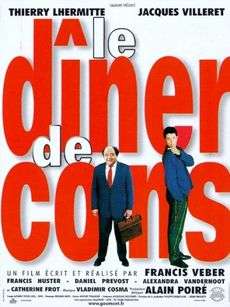The Dinner Game

Every Wednesday, French editor Pierre Brochand and some of his friends organize a very special dinner: a "dîner de cons" (Literally: "Dinner of idiots"), where whoever brings the dumbest guest wins.
Desperate to find a suitable candidate for the week, Brochand invites a friend's recommendation: François Pignon, a taxman who build models out of matchsticks and seems like "a real winner". Unfortunately, Brochand hadn't exactly counted on the fact that on the evening of the dinner, he'd have thrown his back playing golf, his wife would have left him and he'd be stuck at home, alone with Pignon...
A 1998 French comedy by Francis Veber, Le dîner de cons (The Dinner Game) was a financial and critical success in France and in the United Kingdom. Based on Veber's long-running play of the same name, the movie won Best Scenario, Best Actor and Best 2nd Actor at the French Cesar Awards. It remains a cult movie in France and one of the late Jacques Villeret's most beloved roles.
Remade in America as Dinner for Schmucks.
- Believing Their Own Lies: Pignon calls Leblanc as a Belgian film producer to get informations on Brochand's wife. He ends up hanging up without any information on the wife - but he sure is going to get the movie rights for cheap.
- Black Comedy: Only lightly.
- Country Matters: The literal translation of "diner de cons" is, well, let's say it's something slightly ruder than "schmuck". The French word con is now (almost) only used to mean an idiot/moron, but its mainly-forgotten actual meaning is much more offensive in English.
- Crack! Oh, My Back!: Brochand hurts his back playing golf.
- Cut and Paste Translation: Although there's not really a way to make the joke work in English; Sasseur is a perfectly plausible name. "Hissister"... not so much.
- The Ditz: Pignon
- Driven to Suicide: Marlene threatens to commit suicide if Pignon hangs up the phone.
- Dumb Is Good: Pignon is a well-intentioned idiot with a sometimes heartwarming compassion for people he's barely met, Brochand is a smug intellectual snob who mistreats his closest friends.
- False Reassurance: When Brochand tells a friend on the phone that Pignon "looks like a real winner". Pignon sees it as proof that he's going to get a book deal. Brochand knows his friends thinks about the dinner.
- Intimidating Revenue Service: The reason why the music for Cheval's arrival is the theme from Jaws
- The Klutz: François Pignon.
- Lethal Chef: Brochand, when he tries to turn his expensive wine into lower quality claret. Amusingly, he actually makes it better, before making it worse
- Love Triangle: Brochand stole Leblanc's wife. Pignon's wife was stolen by one of his colleagues.
- Mistaken Identity: Pignon mistakes Brochand's wife for Marlene Sasseur.
- Nice Guy: Pignon.
- Obfuscating Stupidity: Pignon is at times shown to be not quite as stupid as Brochand thinks he is - not that that's saying much. And at other times he manages to be much more so...
- Ooh, Me Accent's Slipping: Pignon's Belgian accent, when Just asks him a question he doesn't expect.
- Prank Dinner: Type 3
- Punny Name: Juste Leblanc.
- The Remake: Dinner for Schmucks
- Stop Helping Me!: Brochand to Pignon, after he's managed to fall on him.
- Too Dumb to Live: Pignon, although it's not so much that he's dumb as easily distracted.
- Tough Room: Brochand's reaction to Cheval's jokes when he thinks his wife is at Meneaux's.
- Truth in Television: Veber wrote the play when he heard about dinners of the kind being actually organized by Parisian snobs.
- Two Guys and a Girl: Brochand, Leblanc and Le Guerec
- Unsympathetic Comedy Protagonist: main character Brochand takes part in the dinners, stole his best friend's wife, cheated on her for two years, and now refuses to acknowledge his mistress' existence
- Who's on First?:
- Actually a plot point, when Pignon thinks Marlene is Brochand's sister because her name is Sasseur ("His sister").
- And later, when he's told Leblanc's name is "Juste Leblanc"; "He doesn't have a first name?"
"Votre nom à vous c'est François, c'est juste? Eh bien, lui, c'est pareil, c'est Juste."
Badly translated (juste in French can mean both right and only) "Your name, it's François, it's right? Well, him, that's the same, it's Right".
- With Friends Like These...:
- Brochand is Leblanc's friend, but he steals his wife.
- Pignon to Brochand, at least in the first part of the movie, when he tries to help him and makes everything worse.